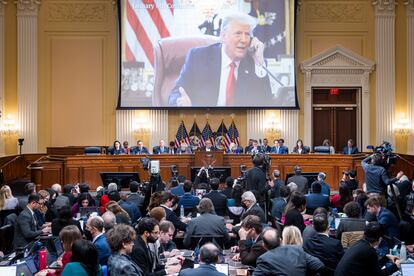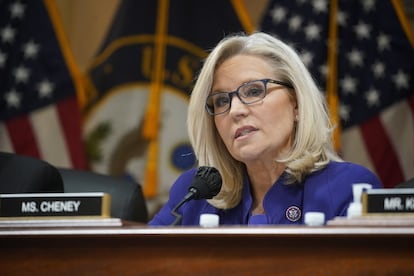January 6 Committee recommends criminal charges against Trump
The House Select Committee to Investigate the January 6th Attack on the US Capitol has concluded 18 months of work with a unanimous vote, recommending that the Department of Justice prosecute the former president on four charges, including insurrection


In a symbolic and historic gesture, the House Select Committee to Investigate the January 6th Attack on the US Capitol unanimously recommended that former president Donald Trump be criminally prosecuted for his events on that ominous day, as well as for his actions during the two months that led up the violent insurrection.
The House commission – comprised of seven Democrats and two Republicans – found that the storming of the Capitol Building nearly two years ago was instigated by Trump’s rhetoric and conspiracy theories, which were based on the false allegation that the 2020 presidential election was illegitimate. The bipartisan group of federal representatives found Trump guilty of four crimes: conspiracy to give false testimony, obstruction of an official procedure of Congress (the vote to certify the victory of President Joe Biden), conspiracy to defraud the American government, as well as inciting and assisting an insurrection.
However, these recommendations are non-binding, as the committee does not have the power to initiate legal proceedings. Democratic Representative Jamie Raskin of Maryland recommended that the Department of Justice – which has opened its own investigation into the events of January 6, 2021 – prosecute the former president on the four charges.
Despite the uncertainty regarding whether Trump will, in fact, be put on trial for anything, the decision of the committee – after an 18-month-long investigation – carries enormous moral weight, proving the involvement of Trump and his followers in various serious crimes. This will undoubtedly have consequences pertaining to how future presidents and presidential candidates conduct themselves, while also affecting the perception of American citizens in the same way that Watergate or the Iran-Contra Hearings once did.
“We have full confidence that our work will provide a road map to justice, so that the guilty pay,” said committee chair Bennie Thompson, a Mississippi Democrat. He assured the media that Trump broke faith with American democracy.
“He lost the 2020 elections… but he chose to try to stay in office through a multi-part plan to overturn the results and block the transfer of power.”
The announcement on Monday, December 19 was the final result of more than a thousand interviews, the review of over a million documents and the summoning of at least 100 witnesses. Some elements of the investigations have reached the American public in a series of 10 televised hearings – some of them aired in prime-time – between June and October of this year.
The last of these sessions is just the start of a turbulent week for Trump. On Tuesday, Congress is scheduled to announce whether or not his tax returns – obtained almost four years ago – will be made public. And, on Wednesday, the January 6 commission will present its complete report, which will be divided into eight chapters.

Two of the commission’s members – Republicans Adam Kinzinger (Illinois) and Liz Cheney (Wyoming) – did not manage to secure re-election to their seats, meaning that their terms end in January, 2023. They were in the minority of their party, which is still overwhelmingly loyal to Trump. The incoming House of Representatives has a slim Republican majority, which they will presumably use to bury the commission’s findings to favor Trump, who is currently making his third bid for the White House.
In her final address, Cheney made reference to Abraham Lincoln and Ronald Reagan, emphasizing that the “peaceful transfer of power” is “at the heart” of the American Republic.
Cheney also recalled that, on January 6 of 2021, the former president stayed in the White House, watching everything unfold on television, fully aware that he was the only person with the power to stop his supporters’ attack on the country’s democratic institutions.
“No man who behaves like that… is fit to hold a position of authority in our nation. He is not suitable for any position,” she concluded.
The request for prosecution comes weeks after the tycoon launched his 2024 presidential candidacy. He did so a few days after the midterm legislative elections were held, in which the Republican Party scored disappointing results in part due to Trump-endorsed inexperienced and extremist hand-picked candidates losing House, Senate and gubernatorial races in key swing states. The extraordinarily early announcement of his intention to run for president was seen as a means of shedding his legal issues – Trump could claim that he is being politically persecuted if he were to be charged with any crimes while in his capacity as a candidate.
In addition to the Commission’s recommendations, Trump’s financial dealings are under investigation in New York, while a grand jury is looking into his attempts to subvert the electoral results in Georgia. The Justice Department – which is not required to heed a congressional committee’s recommendations – will continue its own investigation into the storming of the Capitol.
The hearing served to refresh the memory of the American public regarding Trump’s conduct at the end of his presidency. Graphic video footage and disturbing recordings were played, offering insight into the orchestration of the riot and the violence of Trump’s supporters. In one particularly chilling testimony, a member of the security forces recalled how, when the mobs entered the Capitol, he quickly called his family to say goodbye, fearing the worst.
A recorded statement presented by the committee on Monday offered viewers and listeners a glimpse of Trump’s mindset at the time. When his advisor Hope Hicks told her boss that his insistence on claiming electoral fraud would “damage his legacy,” Trump coldly replied:
“No one will care about my legacy if I lose. The only thing that matters is winning.”
In addition to the criminal charges against Trump, the commission also referred four congressional Republicans to the House Ethics Committee for failing to heed their subpoenas. These individuals are Minority Leader Kevin McCarthy (California) – soon to be sworn in as majority leader – and Representatives Jim Jordan (Ohio), Scott Perry (Pennsylvania) and Andy Biggs (Arizona).
Sign up for our weekly newsletter to get more English-language news coverage from EL PAÍS USA Edition
Tu suscripción se está usando en otro dispositivo
¿Quieres añadir otro usuario a tu suscripción?
Si continúas leyendo en este dispositivo, no se podrá leer en el otro.
FlechaTu suscripción se está usando en otro dispositivo y solo puedes acceder a EL PAÍS desde un dispositivo a la vez.
Si quieres compartir tu cuenta, cambia tu suscripción a la modalidad Premium, así podrás añadir otro usuario. Cada uno accederá con su propia cuenta de email, lo que os permitirá personalizar vuestra experiencia en EL PAÍS.
¿Tienes una suscripción de empresa? Accede aquí para contratar más cuentas.
En el caso de no saber quién está usando tu cuenta, te recomendamos cambiar tu contraseña aquí.
Si decides continuar compartiendo tu cuenta, este mensaje se mostrará en tu dispositivo y en el de la otra persona que está usando tu cuenta de forma indefinida, afectando a tu experiencia de lectura. Puedes consultar aquí los términos y condiciones de la suscripción digital.








































